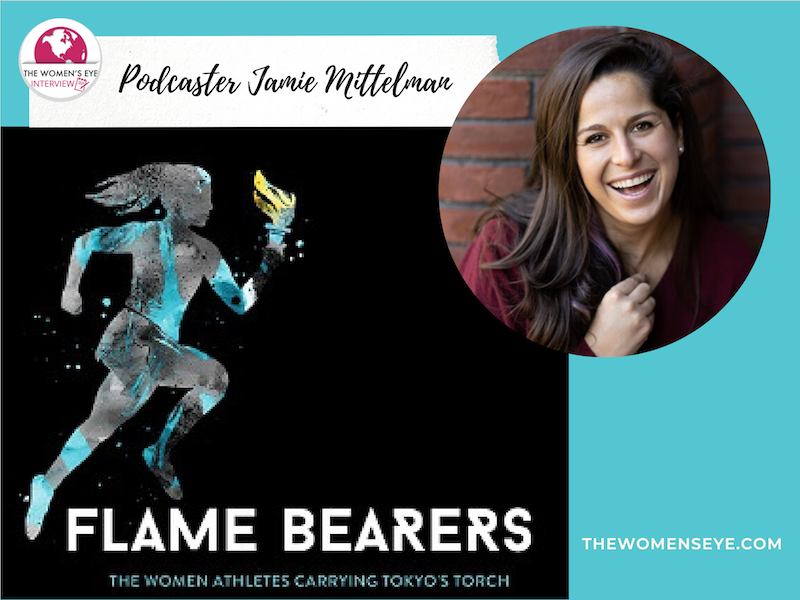
Have you ever thought of starting your own podcast around a passion you couldn’t ignore? Jamie Mittelman did when she decided that women athletes’ stories weren’t being told. She will tell anyone that the big success of her Flame Bearers show is all due to her guests, Olympians and Paralympians, who go beyond their sports to make an impact on future generations.
“I wanted to put the athletes in the driver’s seat and ask what is it that you want to talk about from a personal perspective?… I thought that highlighting these women who really champion the value of grit and resiliency during this challenging pandemic time could be helpful for everyone.” Jamie Mittelman
In truth, Flame Bearers was all Jamie’s idea, and if that weren’t enough work, she also pursued her graduate program at Harvard at the same time. Obviously she is not someone to shy away from challenges. I wanted to know more about how this first time podcaster was able to launch Flame Bearers and her own insights on the demanding world of women in sports…
EYE: Why are you so passionate about bringing more awareness to these Olympian and Paralympian women athletes in Flame Bearers?
JAMIE MITTELMAN: Oh, gosh, where do I start? Less than 4% of all sports media coverage goes to women athletes. There’s a huge inequity in terms of who is getting the coverage. Then if you look at that 3.6%, they’re all athletes who are from the global north, who are white, heterosexual and play specific sports. So the same types of athletes are being covered, and I wanted to do things differently.
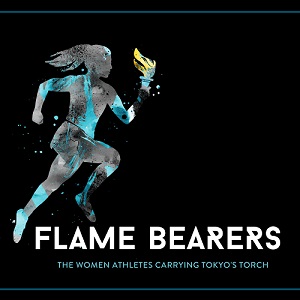
EYE: Did you choose the title Flame Bearers to reflect your goals to be inclusive and inspire?
JAMIE: The idea is that these are women athletes who are carrying the torch for future generations in all their respective industries, fields and passion areas, not just in sports. It could be carrying the conversation forward about pay equity, racial justice or disability bias.
The Olympic torch is such an iconic symbol within the Olympic and Paralympic Games. I think during the pandemic, the iconography of fire and light in times of darkness made sense and felt like a good fit.
For so many, the pandemic has been a time of darkness and challenge. And, we saw ‘flame bearers’ as a beacon of hope or a light for people.
EYE: What do you think athletes’ stories can accomplish?
JAMIE: From a personal standpoint, I’ve found that sport has been one of my greatest teachers. It has given me some of my greatest moments of joy, some of my most embarrassing and most cringe-worthy moments and some really humbling moments. All athletes have these stories and impactful insights to share as well.

EYE: Was the podcast part of your graduate study plans?
JAMIE: Definitely not. I had been pitching a role to the International Olympic Committee. It was going to be a marketing communication solution, specifically around elevating their work with women. And then COVID happened. I, basically, and the Olympics and Paralympics were postponed.
I said, I don’t want to wait another year and not do anything. I want to start something now. And that’s where the idea of, given the skill sets I have, given the access I have, the tools at my disposal right now, what about a podcast?
I think one of the beautiful things about a podcast is anyone can have one. It’s a very democratizing tool in the sense that if you have a microphone, or a computer, an Internet connection, you can make it happen.
I lucked out with the timing in the sense that we had a captive audience of people stuck at home in their homes, isolated and alone. I think people were looking for our stories.
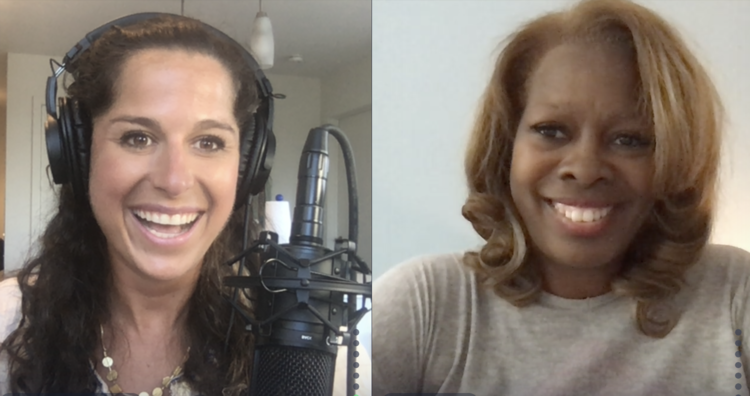
EYE: How successful have you been?
JAMIE: It’s crazy. It’s actually really, really humbling to me. There are a couple of different websites that track the listener base. We currently have listeners in, I think, 47 countries. We are in the top 2% of all podcasts globally based on those listener numbers.
So it has done really well, and I think that’s a testament to the athletes themselves. You know that people are hungry for this content and want to support women athletes right now.
EYE: Was it a tough project for you to start?
JAMIE: It was. My background is in the marketing media advertising space. I had never done a podcast before. This was actually really intimidating for me. I read every book I could. I talked to anyone who had started one before.
This was a jump into the deep end because I really had had never done anything like this before. So it was very challenging.
EYE: How difficult was it to get the athletes to participate?
JAMIE: In the beginning, it was definitely a challenge because I didn’t have a portfolio of work and say this is an example. Since the beginning, though, it’s really taken off because athletes are able to look and listen to the repertoire of work we have to date.
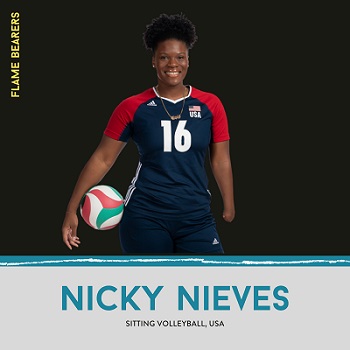
Nicki Nieves was that first interview. As a member of the U.S. Women’s Paralympic Sitting Volleyball Team, she talked about her identity as an AfroLatina.
Our goal at Flame Bearers is to produce every athlete’s favorite work on them ever done. It’s really important to me that every athlete we work with is thrilled with the quality of work and the end piece.
Now they actually refer their friends to me. It’s become increasingly easy as we’ve picked up pace and steam.
EYE: What’s the key to a good interview?
JAMIE: We like to cover the athlete, not just the sport. Many people talk to athletes and focus specifically on the gold medal moment. And the gold medal moment is important. For us that is the entry point into much bigger conversations.
The key to a good interview for us is feeling like listeners can see and hear the person and really get a glimpse of who they actually are when they’re not on the court or field. It’s really important that they share their personality. We like to actually bring in and incorporate two to five contributing experts who know them in every episode.
EYE: What can the basic non-athlete like me get from these stories and interviews?
JAMIE: There’s a huge opportunity for people who are not athletes to realize how connected we are. All too often I’ve noticed that I tend to find myself gravitating towards people whom I find that I think I’m similar to.
In fact, I find sometimes I learn the most from people who I may not have as much in common with on the surface, but I can really learn a thing or two from them. That is one of the overarching things I’m trying to show: the interconnectivity of all women and, actually, you don’t have to be an athlete.
I also like to end our episodes with the athlete suggesting an actionable opportunity for the listener.
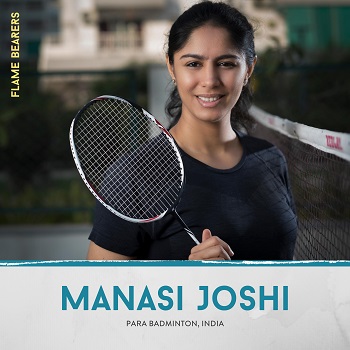
EYE: Can you give me an example of common issues these athletes address?
JAMIE: Manasi Joshi, a Time Magazine’s Next Generation Leader in India, who is the para-badminton world champion, talked about what it means to be a woman as a badminton player in India. The captain of the U.S. National Women’s Soccer team, Becky Sauerbrunn, talked about the pay equity lawsuit.
The common theme here is even though these are women on opposite sides of the world, both have faced challenges related to being a woman. They both want to pay it forward so future women and girls have a better and easier path than they both did.
EYE: What feedback have you gotten from the athletes themselves from your podcast?
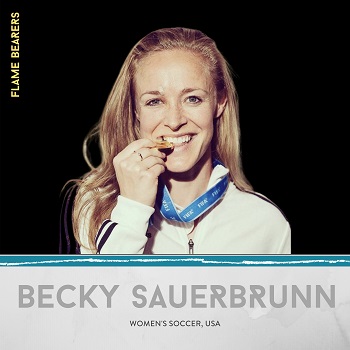
JAMIE: One of the most meaningful comments was actually from Manasi herself. She listened to Becky’s episode and she said she didn’t realize how much all of us are dealing with our own struggles. Flame Bearers shows how an athlete on the opposite side of the world can relate and be connected.
Athletes are also appreciative that we portray them as real people. A lot of times women athletes are sexualized or they’re talked about as two dimensional people who basically just play a sport, not people with minds and hearts and interests and passions.
EYE: What have you taken away from this project?
JAMIE: Personally, sports were a big part of my life growing up. But I have used this podcast and specifically sport as a means of recovery from the great challenge of losing my dad five years ago to incurable brain cancer.
This podcast, by supporting unsung, diverse women’s voices, has helped me realize that the best way for me to heal was to support others. Through giving happiness and focusing on other people, I was able to alleviate some of the pain and burden that I felt. And, on the professional end, I now know I can be an entrepreneur.
EYE: How have you balanced getting your Master of Public Administration degree, which sounds like a full time job in itself I might add, with producing and hosting this podcast?
JAMIE: I’m not going to lie. It’s a lot and definitely at times been overwhelming. I love this master’s program. It’s very much talking and learning about things that I’m really passionate about. That said, I still find myself drawn to working on interviews until one in the morning even when I have an upcoming deadline for a class that I should be focusing on.
So I know exactly where my heart is, to be honest. These athletes, many are not household names, are so incredible and they deserve it.
EYE: You’ve found many of these non-billboard names are very inspirational.
JAMIE: I love having a billboard name athlete like a Becky Sauerbrunn and then producing the next episode with an athlete who no one has heard of. Their stories are just as important and worthy of being heard as the well-known athlete.
Specifically in the context of disability, the first time the Paralympics were ever shown on prime time was this past year during the Tokyo Olympics. Paralympians are disabled athletes who receive practically no coverage.
So of that 3.6% of sports media that goes to woman athletes, it’s in the single decimal, single point of what goes to disabled athletes. I just think it’s a massive opportunity. And if you’re looking for role models of resiliency, Paralympians are some of the best.
EYE: What do you hope listeners get from your podcast?
JAMIE: I hope people feel connected, hopeful and uplifted at the end of every episode.
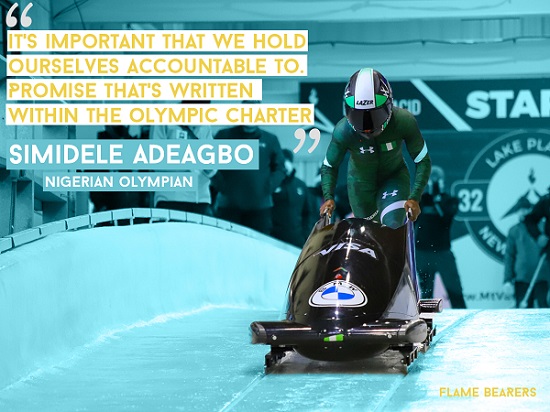
EYE: So what happens with your podcast when all the games are over?
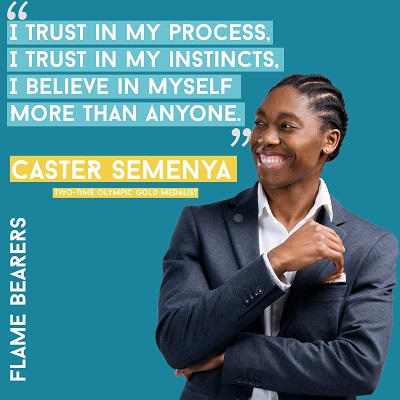
JAMIE: Our last episode of Season Two was with Simidele Adeagbo, the first woman skeleton athlete from Nigeria. We ended Season One with South African runner Caster Semenya, who discussed the testosterone issue.
For Season Three, we look forward to talking about what happens to athletes after the games. What happens when the cameras go off, when the fans go home, when it’s not game time? There are stories to be told about what made it possible for them to compete.
EYE: Do you have any insights for future podcasters or entrepreneurs that you would like to pass along?
JAMIE: This was a great test for me to see what it means to start something on your own. Now I know I can take it from nuts to bolts to scale, which is a really empowering feeling. Talking to women and male podcasters in the space was very valuable.
Take one day at a time. Don’t beat yourself up. I realized that I’ve frequently been the one holding myself back. I no longer want to be that person, that if I have an idea and want to go for it, I need to just jump in with everything that I have.
EYE: Jamie, thank you for inspiring listeners and guests and future socially-minded podcasters! Much success to you in your own impactful future!
Jamie Mittleman’s Social Media:
Website: jamiemittelman.com flamebearers.com
Twitter: @jamiemittelman
Instagram: @jamiemittelman @flamebearers
Facebook: JamieMittelman


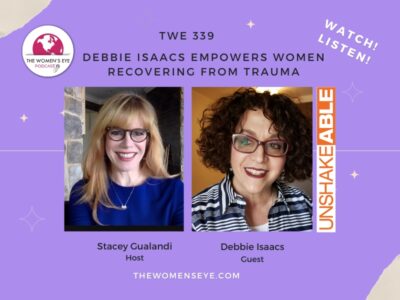
Leave a Reply